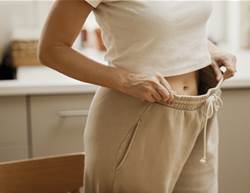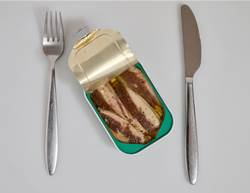As we emerge into summer (and, for some of us, from long months of lockdown), perhaps some kilos have crept on while you were busy taking online cooking classes. But we’re smart enough to know that cutting out all your favourite foods to shrink a dress size by Friday doesn’t really keep the weight off for long. What does work, however, are small simple tweaks to your everyday habits that you can sustain for the long term.
1. Ditch the diets
You’re bound to lose belly fat if you drink nothing but celery smoothies for two weeks, right? While a weight-loss diet might initially melt your fat away, you’ll probably gain it back (and then some). Researchers who reviewed a huge body of literature on dieting and weight-loss programs found that most women regain all the kilos they’ve lost regardless of whether they stick to their diet in the long term or not. One of the largest studies – the Women’s Health Initiative – found almost no change in weight among 20,000 women who followed a low-fat diet for eight years. Indeed, their amount of abdominal fat had actually grown!
2. Chomp more vegies
Not only do vegetables improve your gut health, they’re also full of fibre. A study published in the International Journal of Obesity concluded that high-fibre intake led to lower long-term weight gain. “They’re packed with fibre and micronutrients that give you vitality,” says dietitian Jess Spendlove, director of Health & Performance Collective. “Fibre is also a satiating nutrient that helps you get to the next meal without snacking or overeating. Loading up on low-energy, high-fibre vegetables is good for body composition and managing overall energy intake.” In short, filling your tank with high-quality fuel thwarts hunger.
3. Focus on eating well (not less)
Goodbye, strict dieting; hello, competent eating! Research says that if you want to lose weight and keep it off , you should listen to your body, eat well and not worry about kilojoules and grams of fat. A study in the Journal of Nutrition Education and Behaviour assessed participants’ eating competence, which they defined as having a healthy relationship with food and being in tune with internal food-related signals. Participants who were rated competent eaters were more likely to have lower body weight and BMI, be more active, be less dissatisfied with their weight, eat more fruit and vegies and cook from scratch. If you want to shed belly fat, you should follow your gut and listen to the cues that you tend to drown out by eating quickly or distractedly. The Japanese have a saying: haru hachi bu, meaning “eat until you’re 80 per cent full”. Think about eating until you’re no longer hungry versus eating until you’re stuffed full.
4. Eat protein throughout the day
“Most people consume the majority of their protein at lunch and dinner, but it’s much better to eat it across the day, including breakfast,” says Jess. “Protein is the main nutrient that fills you up and you use more energy to break down protein than you do with carbs and fat. Eating protein throughout the day can lead to better appetite control and improved body composition, if it’s supported with the correct overall energy intake and consistent training.” Jess recommends you aim for 15 to 20g of protein at every meal. “For breakfast, add a small tub of Greek yoghurt and cow’s milk or soy milk to your bowl of muesli,” she explains. “At lunch, include 60 to 100g of fresh or canned salmon or tuna (think one small can) to your smashed avo toast. You should always look for ways to add some extra protein to your meals.” Other good protein sources include eggs, lentils and beans, as well as nuts and seeds – the latter of which make a healthy snack.
5. Use a plate model
The plate model is a visual guide to filling up your plate in a healthy and balanced way. “Start by filling half your plate with colourful, high-fibre vegies that’ll keep you full and this will also leave less room on your plate for high-kJ foods,” says dietitian Brooke Delfino. “Then, fill a quarter of your plate with low-GI, high-fibre carbohydrates such as brown rice, wholemeal pasta or barley. The last quarter should be lean protein such as chicken, fish or lean red meat.” Brooke says this method prevents you from inadvertently loading up on high-kJ foods. “Many of us get the elements right, but not the proportions,” she explains. “The plate model helps you eat a balanced diet and also achieve some weight loss.”
6. Say 'om'
This year hasn’t exactly been relaxing for most of us, so you’re forgiven for being a little on edge. But if you feel more stressed than blessed most days, it’s time to schedule a yoga session, a walk with a friend or any other activity that calms your frazzled nerves. And there’s evidence to suggest that stress can slow your metabolism. Research published in the journal Biological Psychiatry found that women who reported being stressed out in the previous 24 hours burnt 435 fewer kilojoules after eating a high-fat meal than those who weren’t on edge. The difference can add up to five kilos a year.
7. Cut back on beige food
What are beige foods? They’re often foods that come in packets: biscuits, crisps and highly processed foods. Researchers from the US compared the effects of an ultra-processed and an unprocessed diet in healthy adults, who experienced each diet for two weeks in a randomised order and ate as much or as little as they wanted. The study found that participants ate more when they were in the ultra-processed group than when they were in the unprocessed group, supporting the idea that processed food stimulates your appetite. They also gained almost a kilo when they ate ultra-processed food, but lost almost a kilo when they consumed unprocessed fare. “We often go wrong with the types of carbs we eat,” says Brooke. “We need to swap white bread, cakes and biscuits for high-fibre, high-grain foods such as grainy crackers and breads. They don’t give you big spikes in blood sugar and cause you to put on weight like high-GI carbs do.”
8. Respect your lifestyle
If you try to adhere to a strict eating plan that requires you to spend four hours prepping for the week on Sunday and rules out margarita night with the girls, you’re likely to give up because it’s all too hard. “I always tell my clients that if they follow an 80/20 rule with 80 per cent healthy food and 20 per cent indulgence, they’re doing really well,” says Jess. “If they manage 90/10, they’re absolutely nailing it. Consistency is what pays dividends.”
9. Hit the gym
A review of 39 studies on high-intensity interval training (HIIT) found that alternating bursts of intense activity with less intense recovery periods successfully reduces belly fat – both external abdominal fat and internal visceral fat. If you want to shed fat fast, sign up to a HIIT class at your gym or do running intervals. Bonus: All those extra endorphins will lift your mood and help keep depression at bay. A major study found a reciprocal link between depression and obesity: being obese increases the risk of depression, and being gloomy is a predictor of excessive weight. Think of it like this: Exercise enhances your mood to do other things that keep you happy and active, all of which helps boost your metabolism: win/win.
10. Skip happy hour
Many people have been guilty of reaching for an extra glass of wine during lockdown, but the kilojoules can add up quickly. “Not only is alcohol itself high in kilojoules, it also affects your ability to recognise when you’re full and may lead you to overeat,” says Brooke. “You might have a couple of drinks with a hearty meal and then go back to the kitchen later for a snack because you’re feeling peckish. Those kilojoules really tally up, so cutting back on alcohol is a simple way to whittle down your waist.” Meanwhile, the thing you should be pouring into that tall glass is, of course, water. “Up to 60 per cent of the adult human body is water,” says Jess. “When you’re dehydrated, every metabolic function is impacted. Your cognitive function is impaired and you feel sluggish. You’ll then be tempted to eat something to get a boost of energy when your body really needs water.” So drink up!










